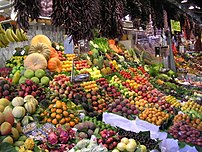Fiber is best known for it's ability to prevent or relieve constipation and promote bowel regularity. This is important because should our digestive processes go wrong. we may retain unwanted calories, fats and toxins after heavy meals. This may lead to variety of conditions-from obesity, diabetes, abnormal blood conditions to fatal coronary heart diseases or even colon cancer.
Fiber helps the digestive process by keeping food moving through the intestines- all the way to the colon or large intestine. A normal digestion lowers the risks of disorders like hemorrhoids, irritable bowel syndrome and the formation of small pouches in the colon called diverticulosis.
Weight loss is another main benefit. fiber has a filling effect, so you don't feel hungry all the time. If you don't eat too much, you don't gain as much.
Making fiber as part of your diet is a challenge in this day and age where the demands at work at home can put a strain on everything - including proper nutrition. Adults need from 20-35 grams of fiber daily. An amount you can get from fresh fruits nuts and vegetables. Fiber sources include:
- Dried beans and other legumes
- Bran cereals
- Sweet corn
- Whole wheat or whole grain
- Cereal products
- Broccoli
- Plums, pears and apples
- Raisins and prunes
- Green and leafy vegetables
- Nuts
- Bananas
- Carrots

A high- fiber reducing diet (which includes a wide variety of beans, nuts, vegetables, fruits and whole grain breads and cereals) can turn diet meals into pleasure. Here are 10 good reasons:
- Fiber-rich foods tastes good! Whole grains (rice, wheat, corn, millet, barley, oats), fruits(a tremendous variety found here in Asia), vegetables (all kinds), and legumes (all beans and peas, which turns out to be the best sources of fiber) make up some of the tastiest food you can find.
- You can eat a much larger volume of food because fiber adds bulk, but not calories.
- Food rich in fiber is the best source of many other essential nutrients, vitamins and minerals, so that additional supplements are unnecessary.
- Fiber-rich foods make you chew more, and because they are in your mouth longer, they give greater satisfaction.
- Fiber also aids in relieving other health problems such as constipation, hemorrhoids and gall bladder disease.
- When the bran part of fiber reaches your stomach, it absorbs the saliva and digestive juices, adding bulk and making you feel fuller.
- Fiber speeds the food on through your large intestine so that all the nutrients are not absorbed, especially nitrogen and fat. This results in more rapid weight loss. Bran from wheat, corn oats, and some vegetables and fruits act in this way.
- Fiber-rich food takes loger to digest, therfore you stay satisfied longer.
- Pectin and gum's also decrease fat absorption and lower blood cholesterol levels, and added bonus to people who want to control weight or prevent heart problems.
- Fiber includes certain gum's and pectin which slow the absorption of glucose (sugar) in your small intestine, thus preventing rapid increases or drops in blood sugar levels. High-fiber foods is thus also good for diabetics as well as those with hypoglycemia (low blood sugar).

The average daily intake of fiber in the westernized and industrialized nations is around four grams. In the so called developing countries, the daily fiber intake hovers around 30 grams, precisely the amount health experts recommend. Conditions of the digestive and intestinal tract common to westernized societies include constipation, cancer of the colon, diverticulosis, and diverticulitis, diseases of the large intestines and rectum, and hemorrhoids. These conditions are uncommon in areas where fiber intake is high.
Fiber assists in removing cholesterol, softens the stool, and relieves constipation. Experts point out that the diet high in fiber helps cleanse the toxins from the blood and liver and goes a long way toward improving the quality of life as we age.
Another important factor in favor of fiber is that it contains no calories, meaning, it can't go to your waist or hips. It passes through the body virtually unchanged. It supplies bulk needed by the instestines to remove body waste with such haste that they don't have time to putrefy and cause irreparable harm. However, a high fiber diet acts to leach some important minerals from the system and quickly excretes them. When adding fiber to your diet. make sure your diet also contains foods rich in calcium (dairy products, egg, beans, cauliflower) magnesium (whole grain, vegetables, fruits) and zinc (milk, liver, shellfish, herring, wheat bran).





